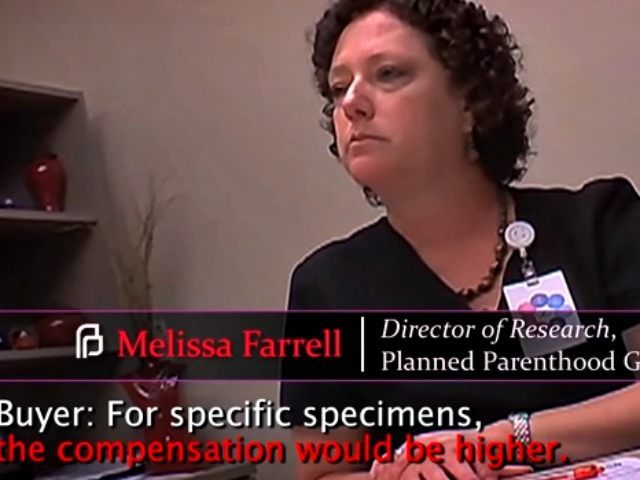An appeal of a $16 million lawsuit brought by Planned Parenthood against the undercover video journalists who exposed its fetal tissue harvesting and transfer practices drew amicus briefs Friday filed by 20 state attorneys general and animal rights activist groups such as People for the Ethical Treatment of Animals (PETA).
The attorneys general of the states of Arizona, Alabama, Arkansas, Georgia, Idaho, Indiana, Kansas, Kentucky, Louisiana, Mississippi, Missouri, Montana, Nebraska, Ohio, Oklahoma, South Carolina, South Dakota, Texas, Utah, and West Virginia have joined in an amicus brief that states the district court “wrongfully discounted” the public policy interest in the undercover work conducted by the Center for Medical Progress (CMP) undercover journalists.
In their summary of the argument, the attorneys general state:
The district court granted Plaintiffs’ motion for summary judgment against Defendants’ public policy defense in its totality. The district court relied extensively on its assertion that the CMP Videos contain “no evidence of actual criminal wrongdoing.” That not only is incorrect on its own merits but also employs the wrong test. The public policy defense is applicable to the claims presented, and its appropriate adjudication must assess the substantial law enforcement and policy consequences of the release of the CMP Videos.
While PETA and the other animal rights organizations that filed an amicus brief assert they are “in support of neither party,” they nevertheless claim to be “scholars of First Amendment and information law.”
The groups state their interest as the need to preserve the ability to conduct undercover investigations:
Amici have an interest in preserving robust constitutional protections for speech (and the precursors of speech) and for those who gather news and report on matters of public concern. Amici have a strong interest in ensuring that individuals remain able to use undercover methods to investigate and report on matters that might otherwise remain unavailable or inaccessible to the public, continuing an American tradition of important journalism conducted using undercover techniques.
“This case implicates the continuing vitality of reporting through investigative deception, which is responsible for some the most noteworthy and impactful stories and exposés in American history,” the groups argue, and continue:
The district court’s decisions on appeal threaten two significant aspects of First Amendment protections that are vital to newsgathering and reporting: first, undercover investigative reporting on matters of public concern pursued through investigative deception is protected speech under the First Amendment; and second, First Amendment limits on recoverable damages for non-defamation civil claims arising out of investigative reporting must be respected to avoid chilling undercover newsgathering and the investigative reporting reliant upon it.
CMP video journalists David Daleiden and his colleague Sandra Merritt filed an appeal at the U.S. Court of Appeals for the Ninth Circuit last week, seeking a reversal of a $16 million lawsuit brought by Planned Parenthood over CMP’s release of undercover videos that, the pro-life group says, show “Planned Parenthood leadership callously negotiating the sale of aborted fetus body parts.”
In December, U.S. District Judge William Orrick III ordered the CMP journalists to pay $13.6 million over the $2 million in damages they were ordered to pay in November 2019 for recording Planned Parenthood officials while they discussed how they harvest the fetal tissue for sale.
A jury previously found the undercover journalists violated the federal Racketeer Influenced and Corrupt Organizations Act (RICO), causing significant harm to Planned Parenthood with its video series, and awarded the punitive damages to the abortion vendor.
Orrick, Daleiden told SiriusXM’s Breitbart News Tonight soon afterward, “is actually the founder of a Planned Parenthood of Northern California clinic in San Francisco.”
The investigator added what he and his legal team discovered about the relationship between Orrick and high-level Democrats:
Planned Parenthood, very intentionally and very strategically and with a lot of gamesmanship, filed this case specifically to get it in San Francisco in front of Judge William Orrick, who is an Obama appointee, who was a bundler for the Obama campaign for hundreds of thousands of dollars, and is best friends with Tom Steyer.
Daleiden and his attorneys unsuccessfully attempted to get Orrick recused from the case several times.
The judge blocked the jury from viewing all the undercover video he produced during his undercover investigation, Daleiden noted.
In addition, Orrick’s wife’s Facebook account was found to have included posted public comments — along with a photo of her and her husband — that indicated support for Planned Parenthood and criticism of Daleiden and CMP.
Planned Parenthood has yet to be prosecuted for any of the allegations of having profited from the sales of the body parts of babies aborted in its clinics, despite multiple congressional investigations and criminal referrals.
In June 2019, Senate Judiciary Chairman (SJC) Lindsey Graham (R-SC) and his predecessor Sen. Chuck Grassley (R-IA), wrote to former Attorney General William Barr and FBI Director Christopher Wray, seeking an update on the federal investigation that was supposedly launched in 2017 into the allegations raised, in part, through the video documentation by CMP.
The senators asked Barr and Wray to respond to their inquiry no later than July 2 of last year.
In August 2019, Breitbart News reached out to the Senate Judiciary Committee (SJC) press team for an update on the Department of Justice/FBI response and was informed SJC was still awaiting a response.
The case is Planned Parenthood Federation of America, Inc. v. Center for Medical Progress, No. 20-16068 in the United States Court of Appeals for the Ninth Circuit.

COMMENTS
Please let us know if you're having issues with commenting.